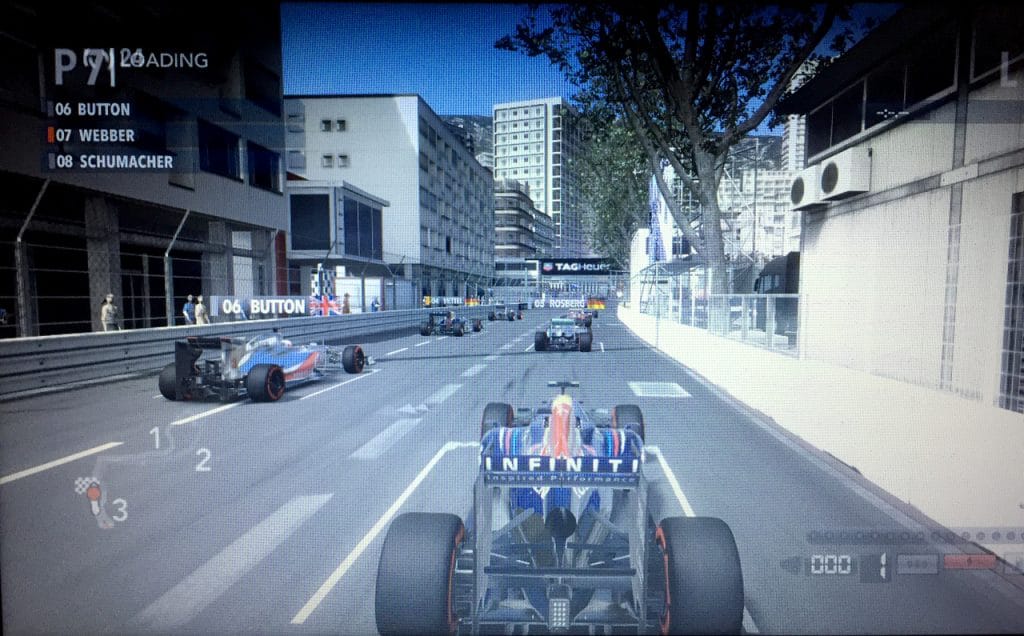I just crashed a Red Bull Formula 1 car. While pushing hard to try and keep up with a Mercedes, I accidentally used a bit too much kerb exiting Monaco’s swimming pool complex, and fired it into the fence.
A lot of people are probably thinking the Monaco Grand Prix was held last month, and maybe wondering how I managed to make the meteoric progression from a Hyundai Excel to a Formula 1 car in the space of a few months.
The answer, of course, is that I wasn’t racing Formula 1 in real life; I was sitting in front of my computer, completing laps of the unforgiving principality street circuit on one of Codemasters’ excellent F1 games.
While this means I don’t have the rock-star lifestyle, private jet or supermodel girlfriend, at least after my misdemeanours I don’t have to deal with an angry Christian Horner or Dr Helmut Marko.
Simulator (sim) racing has grown meteorically in the last decade, with ever-improving technology drawing the virtual experience closer and closer to real life. In recent years, a number of individuals have made the progression from sim racing to real-life competition, thanks in part to programs such as the Nissan GT Academy. I’m thinking about drivers such as Jann Mardenborough, Lucas Ordonez, Wolfgang Reip, Florian Strauss and our own Matt Simmons.
Closer to home, Josh Muggleton was desperately unlucky not to win the Nissan GT Academy, and Justin Ruggier stepped out of online racing to join an elite club of drivers to win two national titles in the same season, taking out both the Kumho V8 Touring Car Series and Australian Endurance Championship in 2014.
Within the last couple of days, we’ve heard the news that the Virgin Australia Supercars Championship is looking at setting up an officially-sanctioned, video game-based competition, similar to what Formula E has done overseas.
15 years ago, racing car games (online or otherwise) were just that – games, a recreational pursuit that didn’t have much in the way of productive value. But the proliferation of official online racing leagues, ever-improving equipment and increasing number of competitors making the successful transition from the virtual to the real world means sim racing is not just emerging as a legitimate pathway into the sport, it has already arrived.
There is still more to come, and out of all the other sports that exist, motorsport is perhaps the very best placed to take advantage of the evolving sim technology.
This is because other sports are inherently more accessible in real life. Anyone can go to the local oval and pass a football or kick a soccer ball around, but not everyone has the logistics or budget to rock up at the racetrack and go for a drive. Simulators put motorsport within reach for people who wouldn’t otherwise have the chance.
Also, technology means we’re probably some way off being able to have a virtual rugby league match against the mighty Parramatta Eels, but we’re certainly able to enjoy the challenge of a virtual Supercars race against Shane Van Gisbergen.
So what does the future hold? Here are my predictions:
- The divide between sim and real-life racing will get smaller. As well as virtual reality technology progressing at a rapid rate, there is convergence from the real-life side of the sport as well, as has already been illustrated with innovations like paddle-shift gearboxes and driver aids like stability control. In other words, a lot of race-car tasks that previously had to be managed by humans are now being looked after by computers. Sim racing is becoming more like real life, but real-life racing is also becoming more like sim racing.
- Because of the point above, we will see more and more people making the transition from virtual to real-life racing and vice-versa.
- Sim racing will continue to grow in popularity and become a genuine career within its own right. Think I’m crazy? It’s already happening. There are leagues with sponsorship and prize-money, and race broadcasts with professional commentators. There are already people who make a genuinely sustainable income in other facets of online gaming and it won’t be long before sim racing follows suit. I haven’t spent a lot of time on my own sim setup lately because I’ve been busy trying to make money doing “real” work… maybe this was the wrong option!
- There will be innovations derived from sim racing that will be developed for real-world applications. For example, when playing racing games offline (i.e. not against human opponents), you compete against “AI” (artificial intelligence) racers instead. These are driven by sophisticated algorithms that predict the movements of not only the human player, but one another as well. With autonomous cars not far away, this sort of software that has the ability to predict movements and reactions is something that has valuable uses in the real world.
All of this is good news for the motorsport industry – anything that makes the sport more accessible to a larger audience has to be a positive. And if it can create benefits for other areas of society, well that’s even better.




